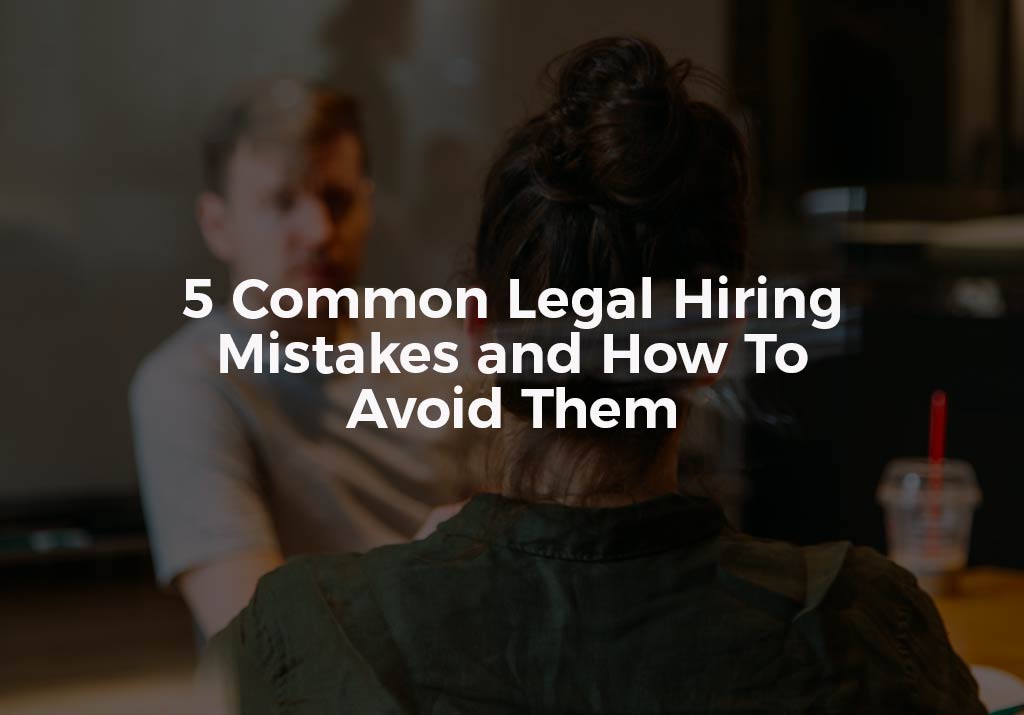Every day we hear of the devastating economic fallout caused by the COVID-19 Pandemic, but fortunately with the massive shift to remote operation, many well positioned SaaS companies are actually experiencing growth during these difficult times.
However, legal hiring mistakes can be costly and potentially catastrophic. Thus, it’s something that you need to be mindful of, and you should do everything you can to keep these hiring mistakes from happening.
To help startup founders like yourself, we’ve compiled a list of 5 common legal hiring mistakes so you can take measures to avoid them and safely grow your company.
1. Not having adequate employee agreements
Although many start-ups begin with a handshake or verbal agreement, legally valid employee agreements are a necessity for every startup. At a bare minimum, you should be using employee agreements that include working hours, rights and responsibilities, pay structure, and termination.
If you are not using employee agreements, you are putting your startup at risk for multiple legal problems.
You should get out in front of this potential issue and use legally valid employment agreements and contracts when hiring new employees.
It’s a small amount of work to prevent a potentially catastrophic issue with your company.
2. Not having confidentiality and invention assignment agreements
Every company should have confidentiality and invention assignment agreements.
It’s critical that a start-up protect its intellectual property with a confidentiality agreement.
If a company does not require employees to sign a confidentiality agreement, then the company is at risk for having their confidential information leaked to a competitor.
Companies provide employees with the resources and environment conducive for inventing new things.
Invention assignment agreements ensure that anything an employee creates will belong to the company and not to the individual employee.
If an employee does not sign an invention assignment agreement, they could invent something using company resources and the company may not have a legal claim to their creation.
3. Failing to enforce non-competition and non-solicitation provisions
Non-competition provisions keep employees from working for a competitor for a certain period of time after leaving your company.
It’s critical that you have and enforce non-competition agreements from day one. This will prevent competitors from stealing your employees away as your company gains more traction.
It’s also important to enforce non-solicitation provisions, which keep your employees from hiring staff away from your company.
If your company has a great culture, there’s a good chance that your employees will develop close working relationships. While this is advantageous for your company, you want to ensure that large amounts of employees do not leave to begin a new venture together at the same time.
When creating non-competition and non-solicitation agreements, you should keep in mind that they need to be legally enforceable.
In order to be legally enforceable, the provisions must be necessary to protect your business interests, not last longer than is necessary to protect those interests, and be within reason.
4. Incorrectly classifying employees and contractors
While it’s enticing to save money by classifying workers as contractors, companies can face legal consequences from employment attorneys or from the IRS if they incorrectly characterize employees as contractors. Thus, you should make sure you use the correct classification for your workers.
There are several factors to consider when characterizing workers. Typically, contractors can set their own hours, have their own business, and the worker provides services to more than one company.
If the worker is required to work a designated schedule of hours for your company, required to work at your place of business, and provides services to your company and no others, they should probably be classified as an employee.
Hence, it’s important to think carefully about worker classification to keep yourself from incurring costs in the long run.
5. Asking prohibited interview questions
When interviewing potential employees, you must avoid asking prohibited questions.
Federal law keeps companies from hiring based on categories like age, religion, gender, or race. If you ask questions about protected categories, you could be faced with a discrimination suit even if those questions do not influence your hiring decision.
Thus, you should avoid asking questions like, “How old are you?” or “What’s your religion?” By avoiding prohibited questions, and educating your interviewers on proper interviewing etiquette, you will decrease the risk of having a lawsuit filed against your company.
A few final words
When growing your company, you will have countless issues on your mind. However, in order to prevent costly mistakes, you need to develop a hiring process that prevents legal hiring mistakes.
If you would like help with developing your hiring agreements, feel free to schedule a free consultation with us.
We would love to help!



